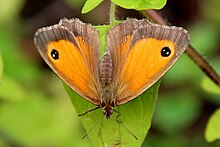Pyronia tithonus
| Gatekeeper | |
|---|---|
 |
|
| Female | |
 |
|
| Female, underside four spots on hindwing |
|
| Scientific classification | |
| Kingdom: | Animalia |
| Phylum: | Arthropoda |
| Class: | Insecta |
| Order: | Lepidoptera |
| Family: | Nymphalidae |
| Genus: | Pyronia |
| Species: | P. tithonus |
| Binomial name | |
|
Pyronia tithonus (Linnaeus, 1758) |
|
The gatekeeper (Pyronia tithonus), sometimes called the hedge brown, is most commonly found in South and East Britain, and confined to coastal areas of south and southeast Ireland. It is also found in the Channel Islands, but not in Scotland nor the Isle of Man. Given its preference for warmer weather, it can be assumed that the restriction of range expansion is due to climate. Colonies will vary in size depending on the available habitat, and can range from a few dozen to several thousand butterflies.
It is a member of the subfamily Satyrinae in the family Nymphalidae. A similar species is the meadow brown; the two species can be difficult to distinguish with closed wings since the underwing markings are very similar. However, the gatekeeper tends to rest with its wings open, whereas the meadow brown usually rests with its wings closed. The gatekeeper is also smaller and more orange than the meadow brown and has double pupils on its eyespots.
Two similar species of Pyronia are found in southern Europe, the southern gatekeeper (P. cecilia) and the Spanish gatekeeper (P. bathsheba).
Pyronia tithonus has two known subspecies. Pyronia tithonus ssp. brittaniae, defined by Verity in 1915, is the subspecies represented in the British Isles.Pyronia tithonus ssp. tithonus, defined by Linnaeus in 1771, is not found in the British Isles. Instead, this subspecies is seen in Central and Southern Europe except Southern Italy and in the Mediterranean Islands except for South Corsica and Sardinia.
The gatekeeper is orange with two large brown spots on its wings and a brown pattern on the edge of its wings. The eyespots on the forewing most likely deflect bird attacks away from the butterfly’s body, therefore the gatekeeper is often seen resting with its wings open. There are a large number of aberrant forms, such as excessa, where specimens have two to four extra spots on the forewing upperside. The number of spots on the hindwing underside also varies.
Male, MHNT
Male underside, MHNT
Female, MHNT
Female underside, MHNT
Female
Female
aberration excessa
Male
Male underside
six spots on hindwing
...
Wikipedia
